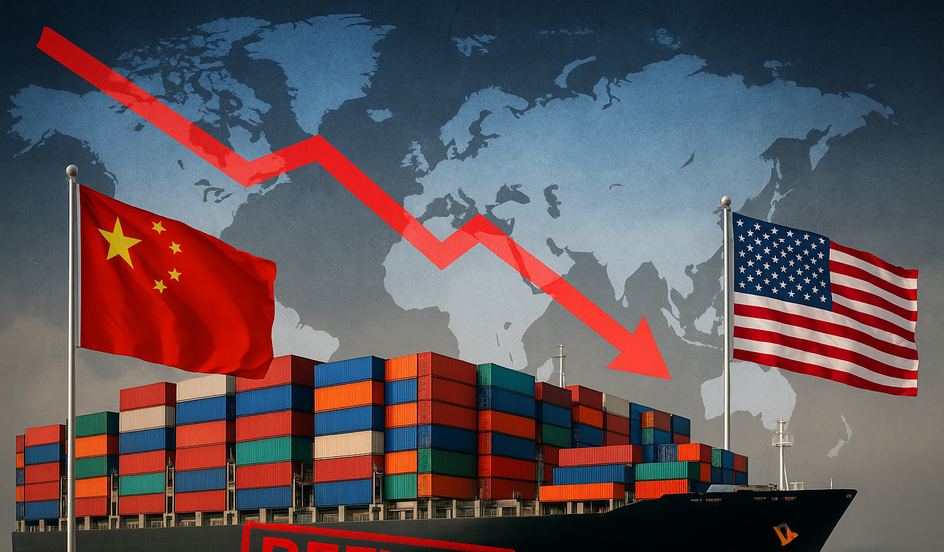Introduction
Recent data from China has sent shockwaves through the global economy. A staggering 33% drop in exports to the US has been reported, while gold prices have surged by 40% and tech stocks are rallying. These dramatic shifts are not just numbers—they signal profound changes for job markets worldwide. In this post, we’ll break down what the China export data crisis means for job seekers, employers, and anyone navigating the evolving world of work.
Understanding the China Export Data Crisis
China’s latest trade figures reveal a complex picture. While the country’s overall trade surplus is up 4% year-over-year, exports to the US have plummeted by 33%. This divergence highlights the impact of ongoing trade tensions, shifting supply chains, and changing consumer demand.
The Hidden Impact on Global Job Markets
Trade shifts like these ripple through the global job market. When exports fall, manufacturing jobs in China and related roles in logistics, shipping, and supply chain management are affected. But the impact doesn’t stop there—countries that rely on Chinese imports or supply components to Chinese factories also feel the pinch. According to global trade statistics, these changes can lead to job losses in some sectors and growth in others, depending on how companies adapt.
How China Export Data Changes Will Create New Job Opportunities
While some industries face challenges, others are poised for growth. As companies seek to diversify supply chains and enter new markets, demand is rising for professionals in logistics, trade compliance, and international business development. Emerging industries—such as green energy, advanced manufacturing, and digital trade—are creating new roles for job seekers willing to adapt. Explore international job listings to see where opportunities are emerging.
Global Trade Shifts, Global Talent Needs
A 33% drop in U.S.–China trade signals major disruptions for industries and workers worldwide. Employers who act now can adapt by hiring resilient, globally minded talent ready to navigate shifting markets. Post your job on WhatJobs today and connect with professionals prepared for a changing global economy.
Post a Job Free for 30 Days →Industries Most Affected by China Export Data Shifts
The sectors most impacted by these export changes include:
- Manufacturing: Especially electronics, textiles, and consumer goods.
- Technology: Both hardware and software supply chains are being reconfigured.
- Solar Panels & EVs: As the world pivots to green energy, supply chain disruptions create both risks and opportunities.
- Steel: Global steel markets are highly sensitive to Chinese export data.
The Rise of Alternative Trade Routes and Job Markets
As companies look beyond China, new trade routes are opening up in Southeast Asia, Europe, and Africa. Countries like Vietnam, India, and Poland are attracting investment and creating jobs in manufacturing, logistics, and technology. This shift is also driving demand for professionals with expertise in cross-border trade and supply chain management.
What This Means for Your Job Search Strategy
Job seekers must stay agile. Monitor global trade trends, develop skills in high-demand areas like supply chain management, and be open to relocating or working remotely. Use resources like WhatJobs to stay ahead of the curve.
Geographic Considerations for Job Seekers
With new opportunities emerging in Southeast Asia, Eastern Europe, and Africa, consider expanding your job search to these regions. International experience and language skills are increasingly valuable assets.
Conclusion: Navigating the China Export Data Job Market
The China export data crisis is reshaping global job markets in real time. By understanding the trends, adapting your strategy, and leveraging new opportunities, you can turn uncertainty into career growth. Stay proactive, keep learning, and use trusted resources like WhatJobs to guide your journey.
Live Example: David’s Career Pivot
David, a mid-career manufacturing manager, faced layoffs as his company’s exports to the US declined. By retraining in supply chain management and leveraging international job boards, he secured a new role with a logistics firm in Vietnam—demonstrating how adaptability and global awareness can turn crisis into opportunity.




